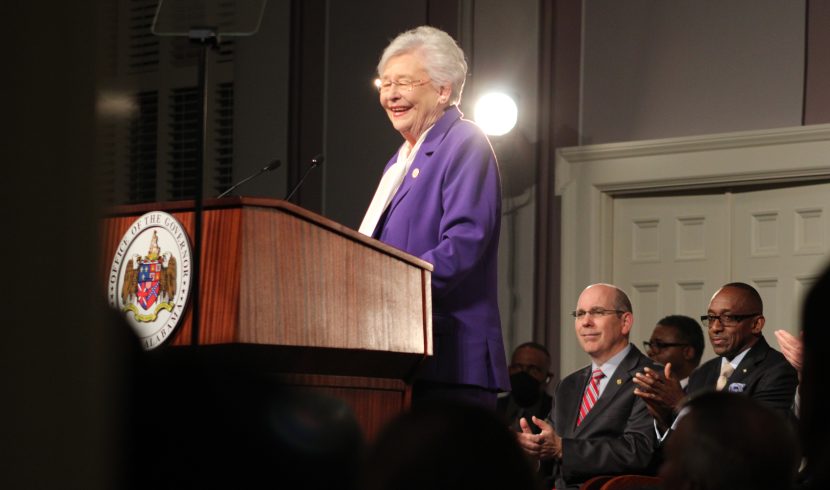MONTGOMERY, Ala. — A proposed health care sciences-focused high school championed by Gov. Kay Ivey for more than a year would be created under a bill filed recently.
The bill’s filing by Rep. Cynthia Almond, R-Tuscaloosa, and Sen. Bobby Singleton D-Greensboro, came after the results of a feasibility study on the school were published. Among the findings of that study, which lawmakers commissioned for $500,000 last September, was that Demopolis was the ideal location for the school, as Ivey had originally proposed.
“It addresses the state’s need for health care workers, and that’s really something that’s trying to directly address the problem we’ve identified as a body,” Almond told Alabama Daily News on Thursday. “So I’m very excited to get behind anything trying to address the problems that we have.”
First mentioned by Ivey during her 2023 state of the state address, the residential school would accept high school-aged students and offer a varied curriculum of science, technology, engineering and mathematics, and health care science courses.
The school would partner with Whitfield Regional Hospital, which it would be constructed adjacent to, and provide students with both hands-on training and pathways to careers in the health care industry. Ivey, as well as the project’s supporters, tout the school as a valuable tool to help produce more health care workers, particularly in Alabama’s rural communities that have seen health care access decline over several decades.
Under the legislation, the school would be funded in part by the state, and would open for the fall semester of 2026, with teens from across the state eligible to attend. The school would house 400 students total – 100 per grade – and is estimated to cost around $62 million.
Ivey has a $30 million earmark for the project in the supplemental education spending bill she sent lawmakers this month.
Consulting firm Tripp Umbach, which performed the study, conducted site visits and evaluations of seven Alabama communities to determine the ideal location for the project. Ultimately, the firm concluded that Demopolis was the ideal site, and cited the city’s community support, partnerships with higher education and medical providers, as well as a $26.4 million pledge secured from Bloomberg Philanthropies.
Ivey pitched funding for the school last year in her spending proposals, but Republican budget leaders in the Legislature requested the feasibility study first. Some still aren’t sold on the proposal.
“The feasibility study certainly addressed come previous concerns and answered some questions,” Rep. Danny Garrett, R-Trussville, told Alabama Daily News. He’s chairman of the House education budget committee. “The study also raised some new questions. I look forward to discussing the study’s results with the Governor’s staff and with House and Senate budget committee members and leadership.”
Sen. Arthur Orr, R-Decatur, the Senate education budget chairman, said the report is still being reviewed.
“Inconsistencies have been pointed out by members who have also been studying the report,” Orr said. “I’m getting a considerable amount of feedback about this proposal from various members.”
Lawmakers from west Alabama and both sides of the aisle are advocating for the project.
“We need more nurses, we need more medical facilities, especially in rural Alabama,” said Rep. Bryan Brinyark, R-Fayette, a co-sponsor of the bill. “Demopolis would be a great place to have this school and develop talent out of that area, so it just seemed that would be good for west Alabama, and the state as a whole.”
Rep. Bill Lamb, R-Tuscaloosa, another co-sponsor of Almond’s bill, told ADN Thursday that he considered the shortage of health care workers to be the largest issue facing Alabama today, and that a tool to recruit more workers in the industry from rural parts of the state was the best approach for such a project.
“I think it’s important for us to start at the high school level and encourage participation and prepare the workforce for tomorrow, just like we do in math and science,” Lamb said. “When we look at the Black Belt and opportunities there, I think we need to spread the opportunities across the state, particularly in west Alabama and rural areas.”
Rep. A.J. McCampbell, D-Demopolis, another co-sponsor of the bill, also argued in favor of establishing the school in Demopolis, and touched on some minor opposition he had seen to the project’s proposed location.
“When someone gets a degree from one of those (more urban) areas, they generally are going to be exposed to that area and then stay there rather than coming back to a rural area, because people tend to look at money more,” McCampbell told ADN Thursday.
“I haven’t seen any (opposition) other than some people that really want it in their area now that the idea has been birthed.”
The bill would also create a board of trustees to manage the school, and would be composed of lawmakers, and education and health care leaders.
“When you train people in rural areas, they have a tendency to want to come back to rural areas, which is the big need,” said Rep. Curtis Travis, D-Tuscaloosa, another co-sponsor of the bill.
“At the same point, if we can get students from (rural areas) where you don’t have a lot of things to do but go fishing, if we can get people toward medical careers, that’s a big win for the state of Alabama. I think Demopolis is a nice little city, but it’s a great place to raise a family, and this also has the opportunity to help transform west Alabama.”
Alabama Daily News Mary Sell contributed to this report.

